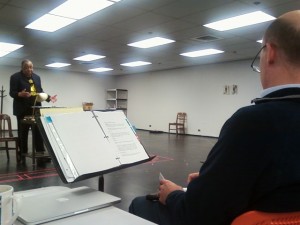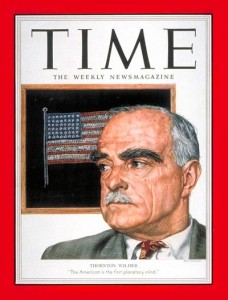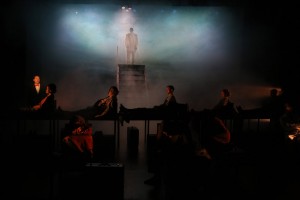 I attended my final rehearsal for the Court Theatre’s upcoming production of Satchmo at the Waldorf on Saturday. On Sunday morning I flew back to New York for the opening night of the new Broadway revival of Fiddler on the Roof, which I’ll be reviewing in The Wall Street Journal later this week. Now I’m en route to rural Connecticut and my beloved Mrs. T via Amtrak, and I can’t wait to reach them both.
I attended my final rehearsal for the Court Theatre’s upcoming production of Satchmo at the Waldorf on Saturday. On Sunday morning I flew back to New York for the opening night of the new Broadway revival of Fiddler on the Roof, which I’ll be reviewing in The Wall Street Journal later this week. Now I’m en route to rural Connecticut and my beloved Mrs. T via Amtrak, and I can’t wait to reach them both.
For the past two weeks, though, I’ve been up to my ears in Satchmo, working hand in hand with Barry Shabaka Henley, Charles Newell, and the staff of the Court. Shabaka (as we call him) is a spectacularly gifted actor who has flung himself with breathtaking abandon into the demanding triple role of Louis Armstrong, Joe Glaser, and Miles Davis. I’ve long thought that Charlie is one of the best directors in America, and having watched him up close, I’m floored by his unflagging creativity and commitment. As for his colleagues, they are without exception both competent and nice, a combination that is gratifying beyond belief. If you suspect that I’m exaggerating…well, I was there, and I hated to go.
 On the other hand, I also hated being away from Mrs. T for so long, and when I return to Chicago to see the show on January 10, three days after the first preview performance of Satchmo, it will be with eyes refreshed by a three-week-long separation. I’m eager to be home again, and almost as eager to return to Florida’s Sanibel Island, which Mrs. T and I have come in recent years to regard as our home away from home.
On the other hand, I also hated being away from Mrs. T for so long, and when I return to Chicago to see the show on January 10, three days after the first preview performance of Satchmo, it will be with eyes refreshed by a three-week-long separation. I’m eager to be home again, and almost as eager to return to Florida’s Sanibel Island, which Mrs. T and I have come in recent years to regard as our home away from home.
All true—and yet Satchmo and my three operatic collaborations with Paul Moravec have taught me that a rehearsal room is the next best thing to paradise, the great good place where you get to spend hours on end doing the kind of work that doesn’t feel like work at all. To be sure, I wrote three pieces and spent many happy hours with Our Girl during my two weeks in Chicago, but for the most part I ate and slept Satchmo at the Waldorf, and along the way I made a couple of dozen new and wonderful friends. It doesn’t get much better than that.
Yes, I’ll be keeping in close touch with the Court throughout the next three weeks. Among other things, I’ll be receiving daily rehearsal reports via e-mail from Amanda Keener-Frederick and Heather Bannon, the production stage manager and assistant stage manager. I’ll also be on call to answer questions from Charlie, Shabaka, or any of the Court’s other staffers. So I won’t be completely cut off from Satchmo. Nor do I expect to feel needlessly nostalgic about Chicago in January when I’m sitting on the porch of our Sanibel Island bungalow, a stone’s throw from the Gulf of Mexico. But I also know that no matter what else I’m doing during my ten days on Sanibel, the Court Theatre will never be very far from my mind.
* * *
Aretha Franklin sings “Come Back to Me,” at a 1968 concert in Stockholm. The song is from the score of On a Clear Day You Can See Forever, by Burton Lane and Alan Jay Lerner:



 Today’s Wall Street Journal contains my best-theater-of-2015 column. Among those present:
Today’s Wall Street Journal contains my best-theater-of-2015 column. Among those present: For most of us, Thornton Wilder is a man of one play, “Our Town.” But he wrote many other plays, two of which, “The Matchmaker” and “The Skin of Our Teeth,” were equally big hits, as well as a number of shorter works that get done from time to time—usually by students—but are almost never produced professionally. Blessings, then, on the Peccadillo Theater Company for giving us “A Wilder Christmas,” a flawlessly staged double bill of rarely seen one-act plays by Wilder, “The Long Christmas Dinner” and “Pullman Car Hiawatha,” that are as extraordinary in their own ways as “Our Town.”…
For most of us, Thornton Wilder is a man of one play, “Our Town.” But he wrote many other plays, two of which, “The Matchmaker” and “The Skin of Our Teeth,” were equally big hits, as well as a number of shorter works that get done from time to time—usually by students—but are almost never produced professionally. Blessings, then, on the Peccadillo Theater Company for giving us “A Wilder Christmas,” a flawlessly staged double bill of rarely seen one-act plays by Wilder, “The Long Christmas Dinner” and “Pullman Car Hiawatha,” that are as extraordinary in their own ways as “Our Town.”… In “Pullman Car Hiawatha,” first performed the following year, the scene is a sleeper car on a train going from New York to Chicago. We see five lower berths and three compartments, all represented by simple chairs and benches, and we are introduced by a genial “stage manager” (Michael Sean McGuinness) to 10 passengers who are traveling west at Christmastime. One is a woman (Giselle Wolf) who is being escorted to an insane asylum, another a housewife (Anna Marie Sell) who will die en route. Yet “Pullman Car Hiawatha” is no “Grand Hotel”-style melodrama but a fanciful group portrait of the passengers and their places in the world…
In “Pullman Car Hiawatha,” first performed the following year, the scene is a sleeper car on a train going from New York to Chicago. We see five lower berths and three compartments, all represented by simple chairs and benches, and we are introduced by a genial “stage manager” (Michael Sean McGuinness) to 10 passengers who are traveling west at Christmastime. One is a woman (Giselle Wolf) who is being escorted to an insane asylum, another a housewife (Anna Marie Sell) who will die en route. Yet “Pullman Car Hiawatha” is no “Grand Hotel”-style melodrama but a fanciful group portrait of the passengers and their places in the world… The weather in Chicago, which has been unseasonably warmish since my arrival last week, is finally starting to get disagreeable, and it rained yesterday morning. So what? Well, it happens that while rehearsals for the Court Theatre’s
The weather in Chicago, which has been unseasonably warmish since my arrival last week, is finally starting to get disagreeable, and it rained yesterday morning. So what? Well, it happens that while rehearsals for the Court Theatre’s